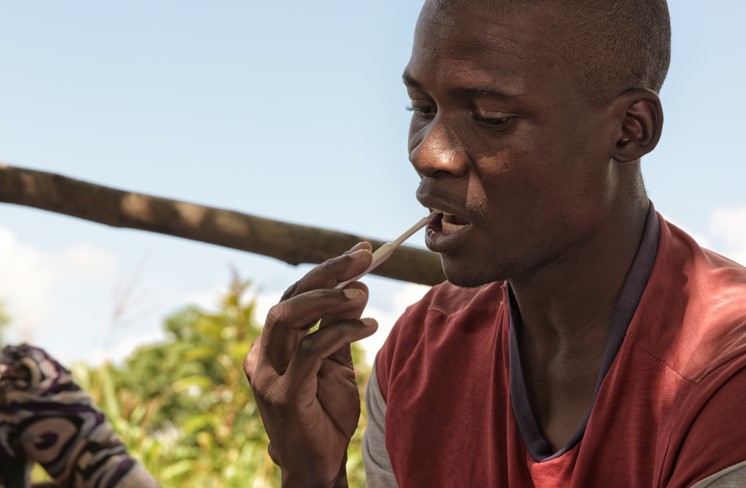
Informing delivery strategies for HIV self-testing kits in Zambia

Context
With close to 20.7 million people living with HIV, East and Southern Africa are among the regions of the world where HIV’s impacts are most severe. Aiming to improve this situation, several countries in the region have made huge strides towards achieving UNAIDS targets to limit HIV transmission. As one example, Zambia has witnessed a marked increase in the levels of HIV testing in recent years.
While HIV testing services (HTS) remain primarily health-facility based, considerable progress has been made in scaling up the delivery of HIV testing services through door-to-door and mobile-based services. Yet inequities remain in testing rates among different groups. According to Zambia’s Demographic and Health Survey (2018), 85 percent of women reported having ever tested for HIV, as compared to 75 percent of men. Men often inferred their status from their partner’s HIV status rather than testing themselves.
HIV testing is a critical step to achieving the first UNAIDS target of 90 percent diagnosis of all HIV-positive persons. More innovative strategies are needed to help countries like Zambia achieve universal HTS coverage targeting hard-to-reach sub-populations. HIVST offers individuals who are reluctant to test the confidentiality and autonomy to decide when and where to test.
The 3ie-supported randomized trial evaluated the effectiveness of the PopART testing and treatment intervention developed by Zambart, a Zambian research organization. In four urban communities in Lusaka, homes in 66 zones received visits in which trained and licensed lay counsellors called Community HIV Care Providers (CHiPs). In half the zones, the care providers offered individuals the choice of finger-prick rapid HIV testing (finger-prick HIV testing) or oral HIVST to be performed with or without their supervision. In the other half of the zones, self-testing was not offered.
Evidence
The study showed that men who were offered the HIV self-test were more likely to test than those who were not. There was no significant difference among women.
Overall, 40 percent of men aged 30 and above undertook testing through unsupervised HIVST or secondary distribution of the HIVST kit. This result shows secondary distribution of HIVST outside of health facilities successfully reaches men who are otherwise not easy for health workers to reach.
Qualitative findings showed that participants appreciated the convenience and control over testing time and space, especially for those whose mobility, social status and working lives make them harder-to-reach populations. Findings indicated that lay counsellors still had a clear role in providing pre and post counselling, facilitating linkage and managing kit disposal.
Findings showed social harms, distress and adverse events on relationships comparable to other forms of testing. However, they highlighted that adverse events from HIVST, such as relationship breakdown, could be exacerbated by existing histories of gender-based violence or alcohol abuse. Further, the findings suggested that careful and detailed communication should accompany distribution of self-test kits to ensure proper use and promote linkage to care.
Evidence impacts
Type of impact: Inform global guidelines and policy discussions
When findings from an evaluation or review can be traced to discussions or actions. Examples include governments or multilateral or bilateral donors’ mentioning the findings to inform policy or programming. To date, we have only one case of an individual impact evaluation informing global health guidelines. WHO guidelines require that the guidance is based on randomised evaluation evidence.
This is one of 3ie’s seven types of evidence use. Impact types are based on what we find in the monitoring data for an evaluation or review. Due to the nature of evidence-informed decision-making and action, 3ie looks for verifiable contributions that our evidence makes, not attribution.
Read our complete evidence impact typology and verification approach here.
Close windowThe World Health Organization strongly recommends HIV self-testing as an approach to improve acceptability of and access to HIV testing services. The recommendation appears in its consolidated guidelines on HIV testing services of 2019, which cite the findings of the 3ie-supported study. The guidelines recognize the safety and effectiveness of direct or secondary distribution of home-based HIV self-testing kits by trained lay providers in encouraging HIV testing among hard-to-reach sub-populations. The guidelines cite the evaluation in Zambia to note that, except where there is a preexisting history of gender-based violence or alcohol abuse in a couple, HIVST offers a testing approach which leads to a comparable number of adverse events to standard facility-based testing. Other sections of the guidelines cite seven other 3ie evaluations; more details are here.
Suggested citation
International Initiative for Impact Evaluation (3ie), 2021. Informing delivery strategies for HIV self-testing kits in Zambia (online summary), Evidence Impact Summaries. New Delhi:3ie.
Related
Preparation meets opportunity: how 3ie’s stakeholder engagement paid off on HIV self-testing
This blog highlights how Zambia’s government engaged with the evidence from 3ie’s HIV self-testing evidence programme.
Evidence impact summaries aim to demonstrate and encourage the use of evidence to inform programming and policymaking. These reflect the information available to 3ie at the time of posting. Since several factors influence policymaking, the summaries highlight contributions of evidence rather than endorsing a policy or decision or claiming that it can be attributed solely to evidence. If you have any suggestions or updates to improve this summary, please write to influence@3ieimpact.org